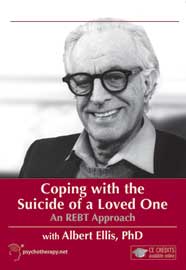
Coping with the Suicide of a Loved One: An REBT Approach DVD
Albert Ellis, PhD
It is certainly a treat to see one of the most bold and influential psychotherapists of our generation in an actual therapy session. Watch Albert Ellis demonstrate his signature style: confrontative, headstrong and steadfastly rational and remarkably effective in just one session.
Learn to use Rational Emotive Behavior Therapy by watching the originator of the method in a therapy session with Roseanne, whose husband committed suicide in front of her and her baby daughter ten years ago. Ellis immediately points out how Roseanne uses the irrational beliefs of condemnation and demandingness to keep upsetting herself about the horrible event. Using REBT techniques, he helps Roseanne separate herself from her actions, reframing her belief that I did a rotten thing/that makes me a bad person to I did a rotten thing/that means I made a mistake, but I am not a bad person. You ll be impressed at how quickly Ellis s reframes take root in Roseanne, as she repeats Ellis s teachings in her own words and from her own heart.
By watching this video, you'll be able to: - Utilize REBT techniques, including defining goals, offering hypotheses about irrational beliefs and new emotions, and disputing inferences.
- Teach clients the definition of a rational belief, an irrational belief and the REBT philosophy on human growth.
- Integrate Ellis s use of confrontation, repetition and rational explanation in your own therapy work with clients.
"There is virtually nothing in which I delight more," says Albert Ellis, "than throwing myself into a good and difficult problem." His self-assurance ? some would even say arrogance ? enables him to confront his clients about their beliefs and tell them what is rational and what isn't.
Albert Ellis was born in Pittsburgh in 1913 and raised in New York City. He made the best of a difficult childhood by using his head and becoming, in his words, "a stubborn and pronounced problem-solver." A serious kidney disorder turned his attention from sports to books, and the strife in his family (his parents were divorced when he was 12) led him to work at understanding others. Ellis made it through college in 1934 with a degree in business administration from the City University of New York. His first venture in the business world was a pants-matching business he started with his brother. In 1938, he became the personnel manager for a gift and novelty firm.
Ellis devoted most of his spare time to writing short stories, plays, novels, comic poetry, essays and nonfiction books. By the time he was 28, he had finished almost two dozen full-length manuscripts, but had not been able to get them published.
In 1942 he returned to school, entering the clinical-psychology program at Columbia. He started a part-time private practice in family and sex counseling soon after he received his master's degree in 1943. At the time Columbia awarded him a doctorate in 1947 Ellis had come to believe that psychoanalysis was the deepest and most effective form of therapy. He decided to undertake a training analysis, and "become an outstanding psychoanalyst the next few years." The psychoanalytic institutes refused to take trainees without M.D.s, but he found an analyst with the Karen Horney group who agreed to work with him. Ellis completed a full analysis and began to practice classical psychoanalysis under his teacher's direction.
In the late 1940s he taught at Rutgers and New York University, and was the senior clinical psychologist at the Northern New Jersey Mental Hygiene Clinic. He also became the chief psychologist at the New Jersey Diagnostic Center and then at the New Jersey Department of Institutions and Agencies. But Ellis' faith in psychoanalysis was rapidly crumbling. He discovered that when he saw clients only once a week or even every other week, they progressed as well as when he saw them daily. He took a more active role, interjecting advice and direct interpretations as he did when he was counseling people with family or sex problems. His clients seemed to improve more quickly than when he used passive psychoanalytic procedures. And remembering that before he underwent analysis, he had worked through many of his own problems by reading and practicing the philosophies or Epictetus, Marcus Aurelius, Spinoza and Bertrand Russell, he began to teach his clients the principles that had worked for him.
By 1955 Ellis had given up psychoanalysis entirely, and instead was concentrating on changing people's behavior by confronting them with their irrational beliefs and persuading them to adopt rational ones. This role was more to Ellis' taste, for he could be more honest himself. "When I became rational-emotive," he said, "my own personality processes really began to vibrate."
He published his first book on REBT, How to Live with a Neurotic, in 1957. Two years later he organized the Institute for Rational Living, where he held workshops to teach his principles to other therapists. The Art and Science of Love, his first really successful book, appeared in 1960, and he has now published 54 books and over 600 articles on REBT, sex and marriage. He is currently the President of the Institute for Rational-Emotive Therapy in New York, which offers a full-time training program, and operates a large psychological clinic.
"I love my work and work at my loving," Ellis says. "That is the secret of my present unusually happy state."